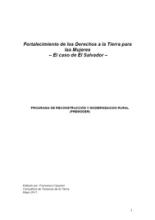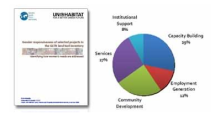Land Library
Bem-vindo à Biblioteca do Land Portal. Explore nossa vasta coleção de recursos de acesso aberto (mais de 74.000), incluindo relatórios, artigos de revistas científicas, trabalhos de pesquisa, publicações revisadas por pares, documentos jurídicos, vídeos e muito mais.
/ library resources
Showing items 1 through 9 of 3651.[From the editorial] This issue of Feminist Africa seeks to explore the interconnections among economic liberalisation policies, land and resource tenures, and labour relations in the structuring of gendered livelihoods in sub-Saharan Africa.
This research has been conducted by RRDTC's action research unit as part of its participation in the Mekong Institute research cycle 2009.
In recent years Laos has experienced rapid changes in land and resource use and tenure. Of those, the allocation of expansive land concessions for rubber production has been amongst the most significant.
This is a 2009 study undertaken by the Rural Development Institute, now Landesa, and authored by Elisa Scalise.
The land management practices of pastoralist Maasai communities have a major bearing on landscapes and wildlife habitats in northern Tanzania. Pastoralists manage lands according to locally devised rules designed to manage and conserve key resources such as pastures and water sources.
Poor rural women are among the most vulnerable people in El Salvador, where the Reconstruction and Rural Modernization Programme was launched in 2003 to aid areas stricken by earthquakes two years earlier. Women’s land tenure was not initially a central theme of the programme.
This discussion paper has been prepared by FAO’s Land Tenure and Management Unit to seek views and comments on voluntary guidelines on responsible governance of tenure of land and other natural resources.
[via UN-HABITAT] GLTN considers gender as a critical cross-cutting theme in the work on promoting pro-poor, large-scale land tools (for more information on GLTN see www.gltn.net).
This study explores consumer acceptance and valuation of a genetically modified (GM) staple food crop in a developing country prior to its commercialization.







